Getting up ‘on time’ on Monday morning may be a risk to your health and memory.
Daylight saving time rolls around at 2 a.m. on Sunday, March 10.
That not only means setting the clock ahead but also losing an hour of healthy sleep.
“Everybody needs between seven to nine hours of good sleep to stay healthy,” said Simon Warby, a Canadian postdoctoral fellow working at Stanford University in California.
“For many people the loss of one hour may not have huge consequences. But for people who are not getting enough sleep, an extra hour loss of sleep can be quite significant.”
The human body prepares for rest several hours before sleep, just as it prepares for waking several hours in advance of getting up.
It also tunes its sleep cycle to the coming and going of daylight, a phenomenon called the circadian rhythm.
When shifting sleep patterns, a body falls out of sync with the rhythm, leading to a lack of sleep. This also happens when changing time zones.
Warby said sleep loss impacts our job performance, how quickly we can think and how fast we react. It can also cause health problems.
“During the shift toward daylight saving time, there’s an increase in the number of heart attacks in the population,” he said.
“It’s also more likely to have traffic accidents because of that loss of hour of sleep.”
Sleep loss also impacts the memory.
Warby’s research, which is funded by the Canadian Institute of Health Research, focuses on the electrical activity of the brain during sleep.
He said there is some evidence that our genes influence the way we learn in our sleep.
At night, healthy brains experience sleep “spindles.” These are short bursts of energy during the time when the brain acts slower.
Warby said the spindles may be linked to the process of organizing learning and memories but they don’t appear the same way in everyone.
“We know that identical twins share 100 per cent of their genes whereas siblings share about 50 per cent,” he said.
“And the twins are more identical in their sleep traits than the siblings. That suggests that the genes are playing a role.”
By understanding if and how genes are involved with the appearance of sleep spindles, he hopes to learn how the brain organizes memories during sleep.
That requires his patients to get enough sleep, however.
“If we sleep poorly, or fail to sleep or been sleep deprived, we learn the things from the previous day very poorly because we did not have a chance to organize these things during the sleep,” he said.
The good news is that we only lose that hour of sleep once a year. Come 2 a.m. on November 3, we gain an hour again.




